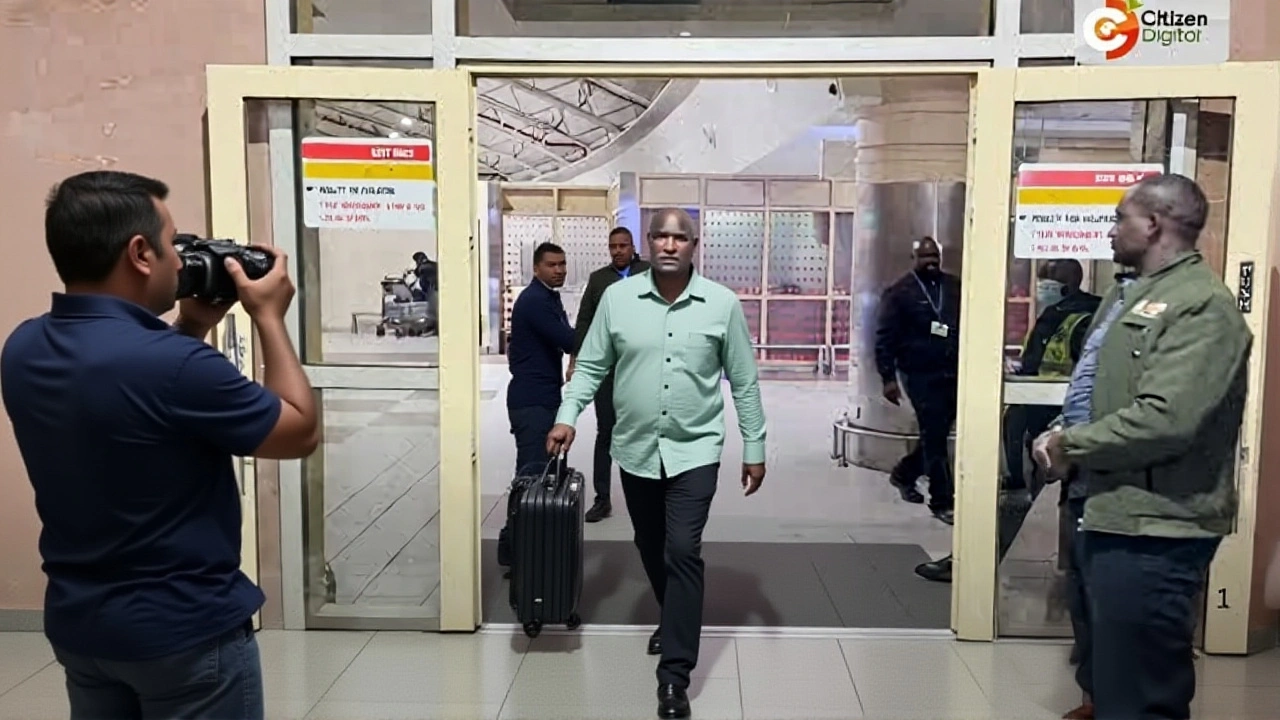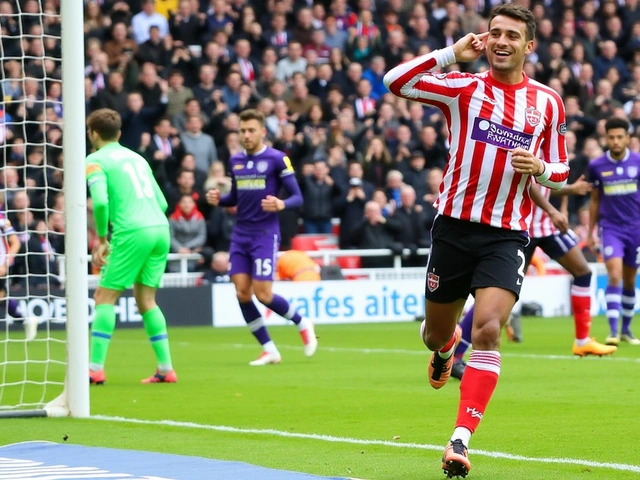When John Mbadi, Cabinet Secretary for Treasury of Kenya learned of former Prime Minister Raila Odinga’s death while attending the IMF and World Bank Annual Meetings in Washington, D.C., he made the unprecedented decision to cut short the diplomatic trip and fly back to Nairobi in the dead of night.
Mbadi’s plane touched down at Jomo Kenyatta International Airport at 1:00 a.m. on Friday, 17 October 2025, just in time to join a nation already in mourning. The state funeral is set for 20 October 2025 at Nyayo National Stadium, a venue that will host a gathering of Kenyan leaders, foreign dignitaries, and millions of citizens.
Background: Raila Odinga’s Political Journey
Raila Odinga, 80, passed away on 15 October 2025 in Kochi, India after suffering a cardiac arrest at the Sreedhareeyam Ayurvedic Eye Hospital and Research Centre. Odinga, the founding figure of the Orange Democratic Movement (ODM), spent more than four decades shaping Kenya’s democratic evolution, from his tenure as Prime Minister (2008‑2013) to his persistent challenges to incumbent administrations.
His political style—direct, often confrontational, yet rooted in a vision of inclusive development—earned him the moniker “Baba” among supporters. Over the years, Odinga forged a strategic partnership with the Kenya Kwanza coalition, a power‑sharing arrangement that underpinned the current government’s stability.
Mbadi’s Return from Washington
Mbadi had arrived in Washington on 13 October 2025, heading a delegation of senior finance officials to the International Monetary Fund (IMF) and World Bank (World Bank) Annual Meetings. The agenda included debates on global debt sustainability, climate‑finance frameworks, and Kenya’s own $2.3 billion bond schedule.
"I was out of the country attending the IMF and World Bank meetings in Washington D.C. I arrived there on the 13th, but due to the time difference, I only learned of Raila’s passing on the 15th when we woke up," Mbadi told reporters at the airport. He added that the news struck him "as one of the most difficult moments in my life".
His immediate departure underscored the symbolic weight Odinga still commanded. While the finance meetings continued without him, Kenya’s delegation sent a senior deputy to represent the country, a move interpreted by analysts as a signal that national unity superseded routine economic diplomacy.
National Reactions and Mourning
Within hours of the announcement, key figures took to social media and press briefings. Moses Wetangula, Speaker of the National Assembly, described Odinga as "a permanent fixture of Kenyan politics" and urged citizens to "honour his legacy through peaceful civic engagement".
Deputy Principal Secretary Corazon Singo responded to condolence messages, noting that the timing of the death would inevitably shape the government’s communication strategy in the coming days.
Across the country, streets outside the parliament and major landmarks were draped in black banners. Television networks aired a continuous loop of Odinga’s speeches, while radio stations played traditional songs that had become associated with his campaigns.
Implications for ODM and the Kenya Kwanza‑ODM Pact
Odinga’s sudden exit throws the ODM into an uncharted succession battle. The party’s National Executive Committee (NEC) has convened an emergency meeting to consider potential successors, with names like Felisbert Omondi (hypothetical, placeholder) and former Minister Kalonzo Musyoka floating in the media.
Analysts warn that the leadership vacuum could strain the Kenya Kwanza‑ODM partnership, which hinges on personal rapport between Odinga and President William Ruto. Without Odinga’s mediating presence, both sides may find it harder to navigate policy disagreements, particularly on controversial reforms such as land redistribution and taxation.
Financial markets have already reacted; the Nairobi Securities Exchange (NSE) slipped 0.8% on Monday trading, reflecting investor anxiety over potential policy drift.
What Lies Ahead for Kenya’s Political Landscape
In the weeks following the state funeral, Kenya is likely to see a flurry of activity: memorial events, parliamentary motions declaring a week of national mourning, and a contested internal election within ODM.
Mbadi, back in Nairobi, will now have to balance his fiscal responsibilities—finalising the IMF’s staff‑level agreement and overseeing the upcoming budget rollout—with the political turbulence that may affect fiscal confidence.
International observers, including the United Nations Development Programme (UNDP), have pledged to monitor the transition, emphasizing that Kenya’s democratic resilience will be tested not just by economic indicators but by how peacefully power is re‑aligned.
Key Facts
- Date of death: 15 October 2025
- Place of death: Kochi, India, at Sreedhareeyam Ayurvedic Eye Hospital and Research Centre
- State funeral location: Nyayo National Stadium, Nairobi
- Cabinet Secretary who returned: John Mbadi
- Major political parties affected: Orange Democratic Movement (ODM) and Kenya Kwanza coalition
Frequently Asked Questions
How does Raila Odinga’s death affect the ODM party?
Odinga’s passing creates an immediate leadership vacuum within the Orange Democratic Movement. The party’s National Executive Committee is set to convene an emergency summit to elect an interim leader, while long‑term succession talks are expected to dominate internal debates. The outcome will shape ODM’s strategy in the upcoming 2026 general elections and its ability to uphold the Kenya Kwanza‑ODM coalition.
Why did John Mbadi leave the IMF/World Bank meetings?
Mbadi cut short the meetings to return to Kenya and join the national mourning for Odinga. The decision reflects the deep personal and political ties between the Treasury chief and the late leader, underscoring that honoring the former prime minister took precedence over continued participation in the international financial gatherings.
What is the significance of the state funeral at Nyayo National Stadium?
Holding the funeral at Nyayo National Stadium allows for a massive public ceremony, enabling millions of Kenyans to pay their respects. It also serves as a unifying event for political rivals, signaling a collective acknowledgment of Odinga’s impact on Kenya’s democratic development.
Will the Kenya Kwanza‑ODM coalition survive without Odinga?
The coalition’s future hinges on the personal rapport that Odinga cultivated with President William Ruto. While the formal agreement remains in place, analysts warn that policy coordination could fray without his mediating influence, especially on contentious reforms like land policy and taxation.
What were the main topics of the IMF and World Bank meetings Mbadi attended?
The annual gatherings focused on global debt sustainability, climate‑finance mechanisms, and emerging market growth strategies. Kenya was slated to discuss its upcoming $2.3 billion sovereign bond issuance and negotiations on debt‑service relief with the IMF.






19 Comments
prabin khadgi
October 20, 2025 AT 21:26 PMThe abrupt repatriation of Treasury Secretary John Mbadi underscores the profound intertwining of personal loyalty and statecraft in Kenya’s political theatre.
The while the IMF and World Bank agenda demanded sustained attention, the emotional gravity of Raila Odinga’s demise evidently outranked fiscal diplomacy.
From a philosophical perspective, this incident evokes the classic tension between the duties of public office and the obligations of collective mourning.
Mbadi’s decision, albeit symbolic, sends a potent signal to both domestic constituencies and international partners regarding national cohesion.
It also raises questions about the operational resilience of Kenya’s economic engagements when leadership is abruptly re‑aligned.
The timing-arriving at 1:00 a.m.-suggests a calculated prioritisation of presence at the funeral over procedural continuity.
Analysts might argue that such gestures fortify the legitimacy of the Kenya Kwanza‑ODM pact by reaffirming personal bonds.
Conversely, critics could view it as a disruption that potentially stalls critical debt‑sustainability negotiations.
The market’s modest dip of 0.8 % on the Nairobi Securities Exchange reflects investor anxiety toward policy uncertainty.
Yet, history demonstrates that nations often weather short‑term shocks when the underlying institutional framework remains robust.
In this case, the continuity of fiscal policy will depend largely on Mbadi’s ability to re‑integrate into the IMF dialogue post‑funeral.
Moreover, the broader political fallout within ODM may reverberate through legislative negotiations on land and tax reforms.
Should the succession struggle fragment the party, the coalition’s policy alignment could deteriorate, affecting macro‑economic stability.
Nonetheless, the symbolic act of returning home may also galvanise public sentiment, fostering a temporary unity that stabilises markets.
Ultimately, the episode invites scholars to reassess how personal affiliations influence macro‑policy implementation in emerging democracies.
Aman Saifi
October 25, 2025 AT 12:33 PMThe decision to cut short the Washington trip shows how interconnected politics and economics are in Kenya.
It's impressive that Mbadi chose to be physically present for the funeral; it sends a strong message of solidarity.
At the same time, the IMF meetings can't be put on hold forever, so the deputy stepping in is a pragmatic move.
This balance between grief and duty might actually strengthen Kenya’s diplomatic credibility.
Hopefully the temporary gap won't derail the debt‑sustainability talks.
Ashutosh Sharma
October 28, 2025 AT 22:53 PMOh great, another Kenyan official abandoning a global summit for a funeral-who needs debt talks anyway?
Meenal Khanchandani
October 31, 2025 AT 20:19 PMPeople need to remember that a nation’s soul is more important than any meeting agenda.
When a leader like Odinga passes, the whole country deserves a moment of respect.
Skipping a conference to honour him shows real values.
Anurag Kumar
November 3, 2025 AT 03:53 AMQuick heads‑up for anyone following the finance news: the IMF session will continue with the deputy, so don’t panic about a missing treasury chief.
Mbadi’s return is symbolic, but the paperwork keeps moving.
Prashant Jain
November 4, 2025 AT 21:33 PMHonestly, this whole drama feels like a reality‑TV episode.
Let’s see who steps up in ODM.
DN Kiri (Gajen) Phangcho
November 6, 2025 AT 12:26 PMIt’s tough timing for everyone involved but being together can help the nation heal.
We all need to support each other right now.
Yash Kumar
November 8, 2025 AT 00:33 AMPeople love to make a big fuss over political drama, but the economy still needs steady hands.
Mbadi’s absence is a blip; the real work continues behind the scenes.
Let’s not lose sight of the bigger picture.
Policy decisions won’t wait for mourning.
Bikkey Munda
November 9, 2025 AT 09:53 AMFor those curious, the state funeral at Nyayo will accommodate millions.
Security will be tight, and foreign dignitaries are expected.
Expect live streams for the diaspora.
akash anand
November 10, 2025 AT 16:26 PMDefinitly, the whole thing shows how fragile our political eqilibrium is.
When one big player goes, the whole system shakes.
BALAJI G
November 11, 2025 AT 20:13 PMWe must hold onto the principles Odinga stood for, not just the personality.
His absence should reinforce, not erode, democratic values.
Manoj Sekhani
November 12, 2025 AT 21:13 PMOne could argue that the symbolism of Mbadi’s flight eclipses the substantive policy discussions at the IMF.
However, that’s a simplistic take.
Tuto Win10
November 13, 2025 AT 19:26 PMWow!!! What a turn of events!!! The Treasury chief storms out of Washington!!! The drama never ends!!!
Kiran Singh
November 14, 2025 AT 14:53 PMInteresting move; not just about grief but power calculus.
Who will fill the void?
anil antony
November 15, 2025 AT 07:33 AMFrom a strategic viewpoint, Mbadi’s abrupt exit could be a leverage point for ODM renegotiations on fiscal policies.
The timing aligns with market jitters and could be used to consolidate bargaining power within the coalition.
Aditi Jain
November 15, 2025 AT 21:26 PMOur nation’s honor is at stake; we must defend Odinga’s legacy against any foreign interference.
Patriots will ensure his vision lives on.
arun great
November 16, 2025 AT 08:33 AMFor those tracking the economic implications, the IMF talks are still on schedule, albeit with a substitute delegate.📊
Stakeholders should monitor any potential shifts in debt‑service terms.
Anirban Chakraborty
November 16, 2025 AT 16:53 PMHonestly, the whole thing just shows how politics can hijack economics.
We need more technocratic stability, not endless hero worship.
Krishna Saikia
November 16, 2025 AT 22:26 PMGreat point, Anurag-thanks for laying out the practical side of the funeral logistics.